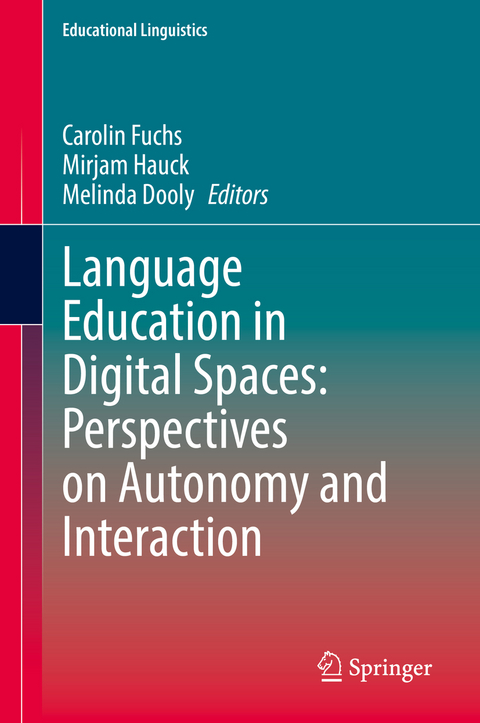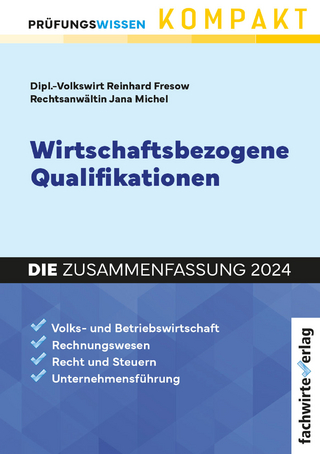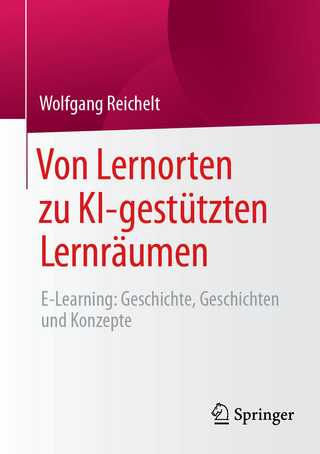
Language Education in Digital Spaces: Perspectives on Autonomy and Interaction
Springer International Publishing (Verlag)
978-3-030-74957-6 (ISBN)
This book brings together contributions on learner autonomy from a myriad of contexts to advance our understanding of what autonomous language learning looks like with digital tools, and how this understanding is shaped by and can shape different socio-institutional, curricular, and instructional support. To this end, the individual contributions in the book highlight practice-oriented, empirically-based research on technology-mediated learner autonomy and its pedagogical implications. They address how technology can support learner autonomy as process by leveraging the affordances available in social media, virtual exchange, self-access, or learning in the wild (Hutchins, 1995).
The rapid evolution and adoption of technology in all aspects of our lives has pushed issues related to learner and teacher autonomy centre stage in the language education landscape. This book tackles emergent challenges from different perspectives and diverse learning ecologies with a focus on social and educational (in)equality. Specifically, to this effect, the chapters consider digital affordances of virtual exchange, gaming, and apps in technology-mediated language learning and teaching ranging from instructed and semi-instructed to self-instructed contexts. The volume foregrounds the concepts of critical digital literacy and social justice in relation to language learner and teacher autonomy and illustrates how this approach may contribute to institutional objectives for equality, diversity and inclusion in higher education around the world and will be useful for researchers and teachers alike.
Carolin Fuchs is Teaching Professor and Coordinator of Online Teaching and Learning at the College of Social Sciences and Humanities at Northeastern University in Boston. She has previously taught at higher education institutions in Asia, Europe, and the United States. Her research in the area of technology-mediated language teaching and learning has been published in international journals and books. She serves on the board of UNICollaboration and is co-editor-in-chief of the Journal of Virtual Exchange.
Mirjam Hauck is Associate Head for Internationalisation, Equality, Diversity and Inclusion in the School of Languages and Applied Linguistics at the Open University/UK. She has published widely on the use of technologies for the learning and teaching of languages and cultures and presents regularly at conferences and seminars worldwide. She is the President of the European Association for Computer Assisted Language Learning (EUROCALL), Associate Editor of the CALL Journal and a member of the editorial board of ReCALL and LLT. She is also a founding board member of UNICollaboration.
Melinda Dooly holds a Serra Húnter fellowship as researcher and senior lecturer in the Department of Language & Literature Education and Social Science Education at the Universitat Autònoma de Barcelona. She teaches English as a Foreign Language Methodology (TEFL) and research methods courses, focusing on telecollaboration and technology-enhanced teaching at both undergraduate and graduate levels. Her principal research addresses technology-enhanced project-based language learning, intercultural communication and 21st century competencies in teacher education. She has published widely in international journals and authored chapters and books in this area of study. She is the former (and founding) editor of Bellaterra Journal of Teaching & Learning Language & Literature and co-editor of the book series Telecollaboration in Education (Peter Lang). She is lead researcher of GREIP: Grup de Recerca en Ensenyament i Interacció Plurilingües (Research Centre for Teaching & Plurilingual Interaction) and member of the editorial board of Language and Intercultural Communication.
Chapter 1. Introduction.- Chapter 2. Learning, Working and Playing Online: University Students' Practices when Collaborating in Social Media. Chapter 3. Exploring Self-Regulated Learning Through Flipped Instruction with Digital Technologies: An Intermediate Spanish Course.- Chapter 4. Supporting Autonomy in an Exam-Based Context: Results from a Hong Kong-U.S. Telecollaboration.- Chapter 5. Where Multimodal Literacy Meets Online Language Learner Autonomy: "Digital Resources Give Us Wings".- Chapter 6. From Autonomous Learners to Self-Directed Teachers in Telecollaboration: Teachers Look Back and Reflect.- Chapter 7. Learner and Teacher Autonomy Through Virtual Exchange: The Use of Videoconferencing Recorded Sessions as Stimuli for Reflection.- Chapter 8. Structured Reflection to Support Pre-Service Language Teachers' Autonomy Development.- Chapter 9. Learnful L2 Gaming: The Wisdom of the Wild.- Chapter 10. Apps for Informal Autonomous Language Learning: An Autoethnography.- Chapter 11. Afterword.
| Erscheinungsdatum | 22.09.2021 |
|---|---|
| Reihe/Serie | Educational Linguistics |
| Zusatzinfo | IX, 230 p. 34 illus., 17 illus. in color. |
| Verlagsort | Cham |
| Sprache | englisch |
| Maße | 155 x 235 mm |
| Gewicht | 517 g |
| Themenwelt | Schulbuch / Wörterbuch ► Wörterbuch / Fremdsprachen |
| Schulbuch / Wörterbuch ► Unterrichtsvorbereitung ► Unterrichts-Handreichungen | |
| Geisteswissenschaften ► Sprach- / Literaturwissenschaft ► Sprachwissenschaft | |
| Sozialwissenschaften ► Pädagogik ► Schulpädagogik / Grundschule | |
| Schlagworte | Auto-ethnographic study on the use of apps for language learning • Autonomy in exam-driven contexts • Exploring Learner Autonomy • Gameful L2 learning • Online informal learning of languages • Technology-mediated learning and teaching |
| ISBN-10 | 3-030-74957-6 / 3030749576 |
| ISBN-13 | 978-3-030-74957-6 / 9783030749576 |
| Zustand | Neuware |
| Haben Sie eine Frage zum Produkt? |
aus dem Bereich


